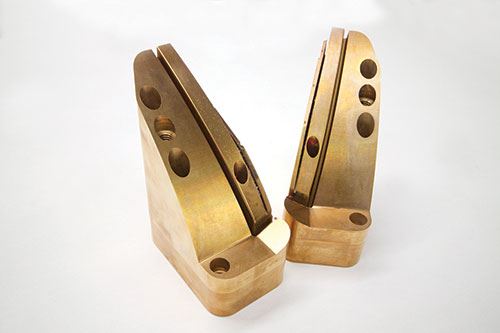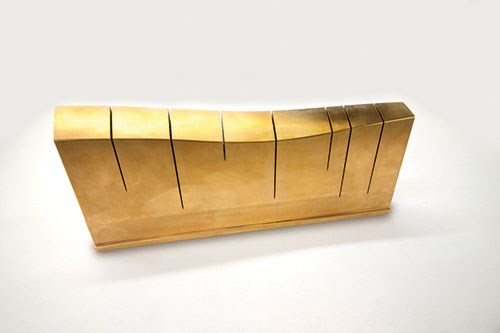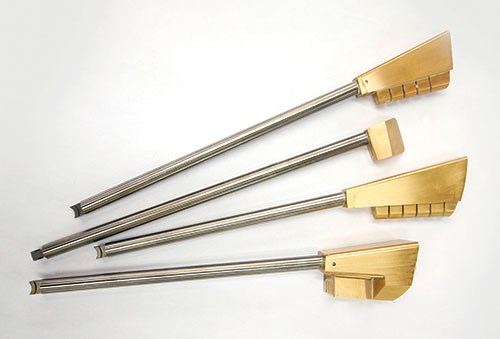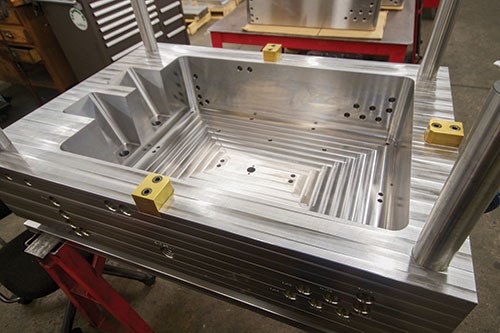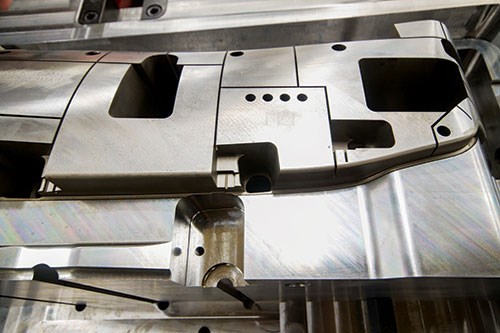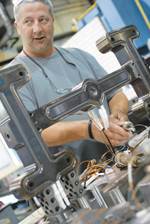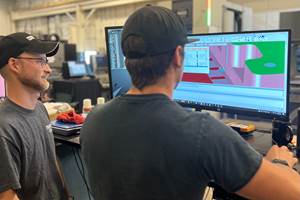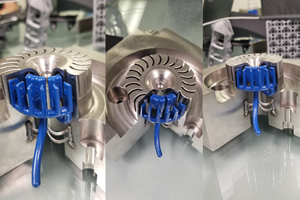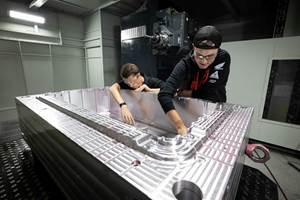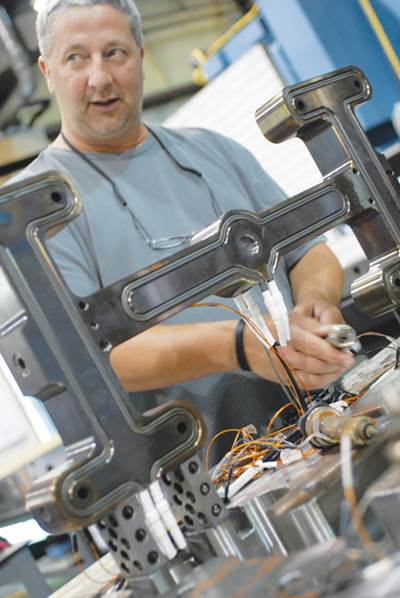The Forecast Called for Aluminum
A look at how one toolmaker engineered hybrid tooling for a Tier One supplier to meet an OEM’s material mandate and aggressive production requirements.
A few years ago, executives from Honda North America called a group of Tier One suppliers together and shared some aggressive numbers. Based on Honda’s new production requirements, the Honda execs wanted these suppliers, who provided assemblies with injection-molded parts, to commit to increased productivity and much shorter cycle times. Honda instructed these Tier One vendors to meet these new production numbers by replacing traditional P20 tool steel in their injection molds with a material offering better thermal transfer and shorter cycle times. Their forecast, in short, called for aluminum.
The Aluminum Trend
The trend in moldmaking today is to build with aluminum and it certainly offers clear-cut advantages over P20 for low-volume production and prototyping. Aluminum adds more thermal capability, but it’s not robust—a key concern, as the suppliers would be using these injection molds for a range of high-volume parts. From Honda’s point of view, aluminum offered benefits in addition to faster thermal transfer and shorter cycle times, including better machinability and faster tooling development and production. The toolmakers would need to meet Honda’s objectives, while also delivering the durability and maintenance specs the Tier One suppliers were looking for.
An internal Honda team worked with Alcoa and introduced them to the Tier One suppliers, saying, “Alcoa is your partner. They know the materials.” As Honda’s global seating supplier, TS Tech participated in these meetings and discussions. Steve Furniss, Department Manager of TS Tech North America’s Tooling Administration, would be the man driving TS Tech’s switch to aluminum tooling.
By his own admission, Steve had limited experience with tooling made with aluminum, but he did his homework. He attended the last two Amerimold expos and had extensive discussions with Alcoa about QC10, a tool-grade alloy that’s harder than most aluminum alloys. The cycle time reductions available with QC10 were impressive, so with his material supplier set, he drew up his short list of toolmakers. Ideally, these toolmakers would understand the production characteristics and maintenance requirements of QC10, and how they differ from those of P20.
Aluminum Experience
That’s where we came in—we meaning JMMS, a second-generation tooling manufacturer headquartered in Easley, SC. We were one of three tooling suppliers TS Tech ultimately selected to build five injection molds with aluminum. When Steve was sourcing the tools and talking to toolmakers, he was clearly looking for total program management—engineering and manufacturing, consultation during maturation and optimization, and maintenance.
We do all of that and as an added benefit, we brought extensive aluminum tooling experience to the table, having built tools with aluminum for customers in other industries. David M. Bowers II, the JMMS CEO, Brian Rossi, our Program Manager, and I participated in a conference call with Honda, TS Tech and the other toolmakers. The challenge, from our point of view, would be to comply with Honda’s material mandate while meeting TS Tech’s requirements for part quality and mold durability.
The Project: Hybrid Tooling
We had detailed early-stage discussions with Steve about aluminum tooling. Eventually, we proposed hybrid tooling instead. Hybrid tooling is a robust solution that combines aluminum with P20 and MoldMax, a copper beryllium alloy that’s much denser than traditional tool steels.
Hybrid tooling is more costly than aluminum tooling, but the engineering pays off with shorter cycle times, better dimensional control and improved corrosion resistance. Each material plays a designated role designed to capitalize on its strengths. The aluminum content in the hybrid tool’s design would comply with the Honda mandate, which was another point in its favor, but we also planned to use P20 for better mold durability and ease of maintenance. In addition to the increased productivity and material selection Honda wanted, Steve was looking for a new thermoplastic injection mold to deliver one million shots, five years in mass production and five more years of service life.
Upfront Collaboration
We made multiple visits to TS Tech to meet with Steve and his production and plant engineers, discussing the parts, injection molding and the plant’s maintenance process, so we were comfortable with the specs and warranty requirements. The hybrid tools we planned to build for TS Tech would use engineering we had tested and proven with thermoplastic injection molds for other industries.
Hybrid tooling combines materials for specific performance and production characteristics, while also minimizing each alloy’s individual weaknesses. In addition to Alcoa’s QC10 aluminum, we spec’d MoldMax for the shut-offs because of its hardness (in addition, the two percent beryllium content in MoldMax would offer better thermal conductivity). We planned to build TS Tech’s new tools with a P20 support system for durability and add QC10 for thermal conductivity.
The QC10 inserts would provide conformal cooling, but as so often happens in engineering, solving one problem created another. You have to be careful clamping on aluminum because it will wear, so we developed a solution that backed the QC10 inserts with P20, installing zero pads to protect the parting line.
Engineering
David and Brian drove the engineering from start to finish, focusing on our key objectives — aluminum content and shorter cycle times for Honda, plus the part quality and tool durability TS Tech wanted (which meant no increase in preventive maintenance requirements compared to P20 tools).
Our engineers stayed in constant contact with Steve and TS Tech during the mold design phase, reviewing the drawings and also discussing part design (we always look for part design enhancements, reducing heavy wall sections to decrease material usage and part weight). TS Tech had specific requirements for material flow, the parting line, gate location and ejector marks, so we had to factor these into the engineering. We also look for tool design opportunities and we found them here, extending the tool life by correcting problems with the parting line and not having enough draft on the shut-offs.
Tryout and Optimization
We had mold tryouts in December 2011 and January 2012 followed by two rounds of data review and optimization. Brian Rossi’s a veteran toolmaker and he made key suggestions during maturation that Steve approved—spacing the waterlines differently than on standard P20 tools, for example, and changing the shut-off angles to reduce wear. Once we’ve made our preliminary decisions, the tool is 90% ready, so optimization is our last chance to add to the tool’s integrity.
JMMS also suggested some minor changes on part design, to ensure cleaner ejection and better dimensional control. Following tryouts and optimization in South Carolina, we sent the tool to Ohio to go through PPAP. The mold performed well—too well, as it turned out. The hybrid tool’s reduced cycle time meant it was exceeding the capabilities of the molding machine, “pushing the bottleneck somewhere else,” as David Bowers explains. Our solution made screw speed adjustments to realign the mold with the production process.
Monitoring and Meeting Objectives
We started building our first tool during Fall 2011 and delivered it in February 2012. We’re now in the monitoring phase with Steve and his colleagues. At this point, we can say that we’ve met our customer’s objectives (and their customer’s too). The new thermoplastic injection mold has provided the improved thermal capability and shorter cycle times required for increased capacity. We haven’t seen any maintenance or warranty issues, which I credit to solid engineering, high-level build quality and of course, a more experienced approach to material selection.
TS Tech’s molding subsidiary maintains the mold and we stay in close contact to make sure cycle times, material usage and part quality remain in control. JMMS is currently in discussions with TS Tech on a hybrid tooling program for textured surface parts, which we’re looking forward to starting.
Lessons Learned
So what are the lessons learned? From our point of view, OEMs and Tier One vendors need to work with tooling companies who can add value with experienced, proven engineering. Aluminum is certainly a valuable material for mold manufacturing, but in the end, you’re investing in a process—one engineered to deliver a specified set of performance and production characteristics. It’s easy enough to build tools with aluminum for faster production and increased capacity, but these gains have to be weighed against the tool’s durability and maintenance requirements. Saving money with a lower cost tool that requires excessive or unplanned maintenance and repairs, or that fails before the end of the program isn’t going to work in the long run.
Our goal, ultimately, is to do more than make and sell tooling. We’re looking for long-term customer relationships, where our total program management and our engineers can add value at every point in the process. We want to work with customers who can tell us what they want, but are wise enough to know that good tooling engineers will go beyond that to give them what they need.
When the customer and toolmaker both approach tooling as a strategic investment in quality, and both recognize that tooling engineering adds significant value, then you wind up with innovations like hybrid tooling. And these innovations deliver the return on investment you want—along with a sunny long-range forecast.
Contributor:
Rich Martin is Business Development Manager of JMMS, a second-generation manufacturer of tooling for plastics and die casting based in Easley, South Carolina.
For More Information:
JMMS Inc.
(864) 855-0450
rich.martin@jmmsinc.com
jmmsinc.com
Related Content
Integrated CAD/CAM Streamlines Electrode Manufacture, Improves Quality
A focus on electrode design and automation helps toolroom improve efficiency, reduce tooling costs and deliver higher quality products.
Read MoreCAD/CAM Software Reduces Delivery Times by 70% With a Six-Month ROI
Single integrated CAD/CAM package reduces translation errors, simplifies design process, improves shop efficiency and shortens tool lead times.
Read MoreLarge Hybrid Steel Insert Solves Deformation, Dimensionality, Cycle Time Problems
DMLS printers using metal additive powders selected by Linear AMS to produce high-quality, accurate, consistent 3D-printed mold components with certification and traceability.
Read MoreHybrid Milling/Drilling Machine Reduces Total Mold Machining Time
MSI Mold Builders now squares, plus drills and taps eye-bolt holes on 50% of its tools in a single setup using a five-axis milling/drilling center with a universal spindle.
Read MoreRead Next
JMMS: A Family’s Legacy
Over the past 23 years, JM Mold South (Easley, SC) has reinvented itself a number of times—beginning with a focus on consumer molds, a diversification into automotive molds, and a name change to JMMS as the torch passes from one generation to the next.
Read MoreReasons to Use Fiber Lasers for Mold Cleaning
Fiber lasers offer a simplicity, speed, control and portability, minimizing mold cleaning risks.
Read MoreHow to Use Continuing Education to Remain Competitive in Moldmaking
Continued training helps moldmakers make tooling decisions and properly use the latest cutting tool to efficiently machine high-quality molds.
Read More
